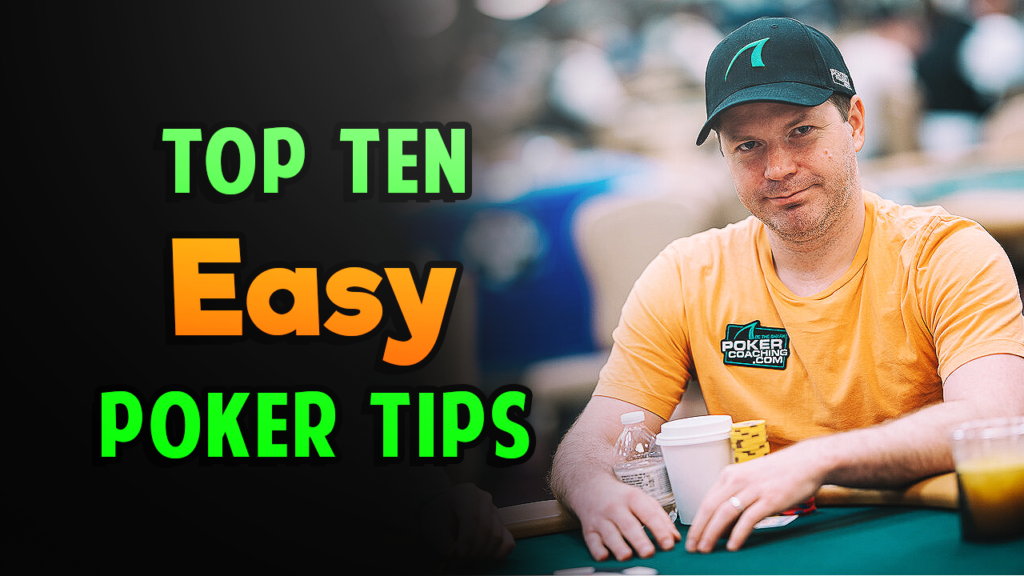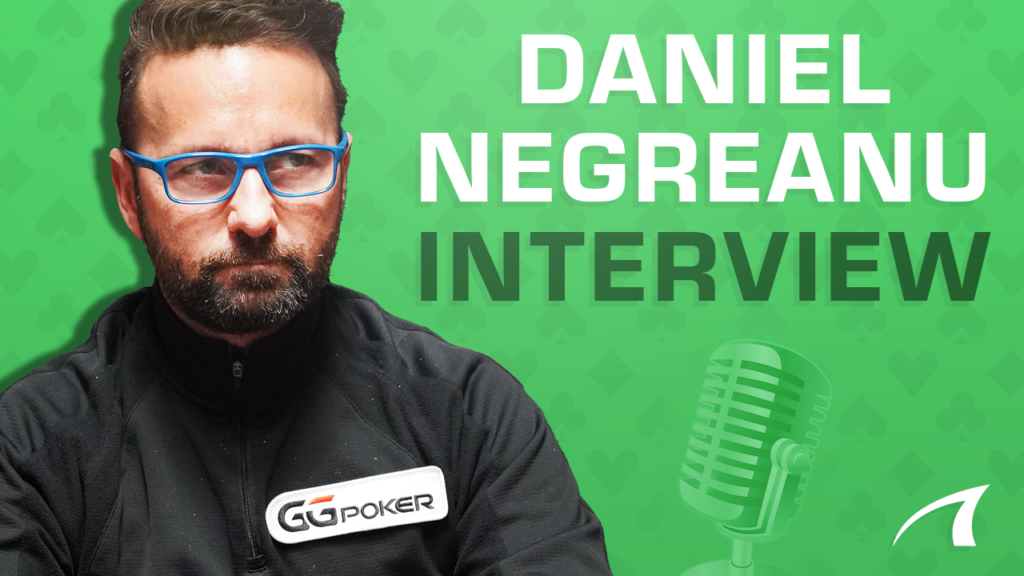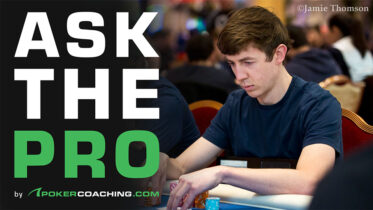Despite being a two-time World Poker Tour (WPT) champion, PokerCoaching.com coach and founder Jonathan Little has spent plenty of time at the live cash game tables. Regular attendees of Little’s webinars and weekly live streams have likely heard him reference the days when he would grind the $5/$10 game that runs daily at Bellagio. Prior to meeting his wife and settling down in New York City, a young Jonathan Little would spend his days grinding on the cash game felt, within the confines of the most famous poker room in the world. When instructing his students on how to make money playing poker, Little’s advice is simple: “Find a game you can beat, and play it a lot.” Having found a game he could beat in the poker capital of the world, Little continued to grow his bankroll and make his mark on the poker industry.
In honor of the upcoming release of the Advanced Cash Game Course, Little took the time to reminisce on his days grinding $5/$10 at the Bellagio and told me more about his early cash game career.
The Daily Routine of a Cash Game Player
Having worked in the poker industry full-time for the past two years, I get to play many hours of poker regularly. That said, my time at the table comes after work duties and all of the other commitments that come with being a productive adult. Sure, I get to play many hours of poker every week, but it dwells in comparison to the amount of time full-time players spend at the tables.
Many recreational poker players, myself included, often wonder what it is like to be a full-time cash game player. Sure, we know being a full-time player includes playing a lot of poker, but what does the day-to-day life of a cash game pro look like? Do they exercise regularly? Is it hard to eat healthy? Are they staying up incredibly late each night and getting no sleep?
When asked about his daily routine while grinding at Bellagio, Little gave me a breakdown of his usual day.
“I would wake up at 9 AM each day, work out for an hour, and then get to Bellagio by 11:30 AM,” Jonathan said. “I was living in Southern Highlands near the M casino, which is a 15-minute drive from Bellagio. I liked living 15 minutes away from a casino because by the time I got home at night, I was fully decompressed and ready to sleep. I would quit playing each day at midnight and go to sleep at 1 AM or so. It was a grind, but I liked it.”
As a poker coach, Little regularly teaches students how consistent study is essential to success as a player. Naturally, I asked him how often he studied between cash game sessions.
“At that point, I did not do too much studying away from the table because I had already spent a ton of time studying deep-stacked strategies in preparation for the early levels of tournaments,” Little shared. “Most of my ‘study’ was at the table where I would consistently try to figure out how I would play specific types of hands against my specific opponents. When you grind 12 hours each day, there is not a whole lot of time for studying away from the table, which will result in you getting richer in the short term but not much better at poker.”

Crush cash games and poker tournaments with Jonathan Little’s Top Ten Poker Tips!
Supplementing Poker Tournaments with Cash Games
Moving from Florida to Las Vegas in 2006, Little jumped straight into the world of live cash games, but that did not mean he wasn’t playing poker tournaments as well. While Little played his highest volume of cash games between 2007 and 2009, he would also win his two World Poker Tour titles within that time frame (the $10,000 WPT Mirage Poker Showdown in 2007, and the WPT World Poker Finals in 2008). When dictating his play schedule, Little would grind cash games at the Bellagio when he wasn’t busy crushing WPT events.
“I would play most of the World Poker Tour series, which would take place roughly one week each month,” Little said. “When I moved to Vegas in 2006, I played mostly tournaments, but as I realized I had a lot of free time due to tournaments not running all the time, I made a point to play more cash games.”
As Little experienced success in both tournaments and cash games, he eventually greatly lowered his cash game volume.
“I eventually stopped playing so much live cash once I had built a healthy bankroll and transitioned to large, less frequent games,” Little said. “I also started traveling overseas a lot more to play live tournaments and played most of the World Poker Tour series, which would take place roughly one week each month.”
While Little would leave his rigorous cash game schedule in the rearview, the wealth of knowledge he gained has never left him, and he looks forward to sharing it in the upcoming Advanced Cash Game Course.
Competing Against Some of the World’s Best Poker Players
Being a $1/$2 cash game grinder, naturally, I was curious about the level of competition Little faced at the higher stakes. While there were certainly incredibly skilled players to not take lightly, just like any other stakes, there were opponents in the player pool that kept the game profitable.
“Back when I played a lot of $5/$10 and $10/$20 at Bellagio, most of the regs who ground on a daily basis were a bit too tight and passive. They would rarely 4-bet and would not put in a lot of big blinds without a decently strong hand,” Little said. “There were a few regs who were much more loose and aggressive and they were much more difficult to play against, and looking back, they played a similar strategy to the one I used. The recreational players’ strategies varied, but most of them played too loosely and passively. Whenever they made top pair, they would not fold, allowing me to get full value when I happened to make a premium hand.”
Amongst the sea of regular grinders and passive recreational, some skilled professional poker players would also visit Bellagio to make their living. Recounting his time playing cash games in Las Vegas, Little recalled a memorable hand he played with a friend and fellow pro.
“I played against many players who are now considered some of the best in the world. I remember a fun hand I played against my friend Justin Young,” Little shared. “We were playing $10,000 deep at $10/$20. We put in something like $2,000 for each pre-flop. I had pocket aces, and he had 9-2 offsuit. He flopped two pairs and took all my money, fun times!”

Check our Jonathan Little’s exclusive interview with “Kid Poker” himself, Daniel Negreanu.
Jonathan Little’s Cash Game Performance
Despite being on the worst end of a bad beat from a fellow pro, Little won way more than he lost. Reflecting on his winnings and memorable sessions, FieryJustice shared how his best performances came when he “shot took”.
“My biggest wins came from sporadic shot-taking when an abnormally large game would materialize. A few times $200/$400 would run when a few recreational players came in and wanted to gamble,” Little said. “This only happened a few times and the games never lasted too long, but I won every time, with my biggest win being $80,000.”
Many recreational cash game players prioritize “booking wins” and often decide to leave the table even if the game is good. PokerCoaching.com members familiar with Jonathan Little’s Cash Game Masterclass know that this is the wrong mindset to maintain. As Little says, successful cash game players look at cash games as being one long session. Since the game remains the same and the blinds never increase, cash game players only hurt themselves when they prioritize booking wins over playing in +EV games. That said, even The Boss himself would leave the table if things weren’t going well.
“When I played a routine $5/$10 game, I would cap my losses at $4,500, which would happen once or twice each month,” Little said. “I would not cap my wins, and I do not remember how much my biggest win was because, in reality, it does not matter too much.”
Conclusion
Having an illustrious poker career spanning nearly two decades, Little has seen it all and has experienced success in nearly every variation of no-limit Texas Hold’em. Cash games, tournaments, and sit & go’s as well, Little has not only crushed poker but has made it his mission to help people become better players. Having made a living from poker, Little now focuses on instructing students on how to benefit from the game that he has built a livelihood on. In his mission to teach students how to become winning poker players, Little’s next contribution comes in the upcoming Advanced Cash Game Course, specifically his chapter on deep stacked adjustments.
A special thank you to Jonathan for taking the time to share more about his career as a cash game grinder in Las Vegas. Be on the lookout for the upcoming Advanced Cash Game Course coming later this year to PokerCoaching.com premium members. If you can’t wait to start learning from Little, be sure to check out Jonathan’s article on the best way to bluff in poker games!




